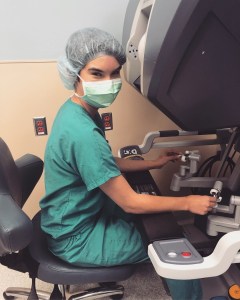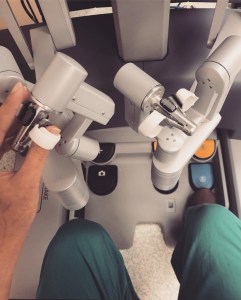Rotation Recap: General Surgery
My general surgery rotation took me to Raleigh, North Carolina and one of the nicest hospitals I’ve ever been to — UNC Rex. There is always a certain amount of nerves and apprehension starting a new rotation each month but being out of the state, in a city where I knew no one, in a hospital I’d never been to had me a nervous wreck. I found a place to stay on rotatingroom.com and luckily, I got along with my temporary roommate well and made a great friend. I’m happy to say that my preceptor was a kind, excellent surgeon and the entire hospital staff was warm and welcoming. There were also no residents, fellows, or many other students there at the time, so I got a TON of hands-on experience with first assisting, driving several different types of laparoscopic cameras, inserting trocars and then docking the Da Vinci robotic surgery system, troubleshooting the robot, and was even able to learn to use it myself. INCREDIBLE! I also got to work alongside surgical PAs in EVERY speciality, including multi-specialty, surgical bada**es from a group called Elite Hands. North Carolina is a great state for PAs to work, by the way! Although I worked every day (sometimes 12-14 hours per day) and joined providers on weekend call, the month flew by and I found myself feeling sad to leave my new Raleigh family at Rex. If any of you are reading this, half of you still owe me money from those NBA playoff bets. Paypal is fine.
How To Prepare
Forget Your Comfort Zone, It’s Cancelled. – You will be watched like a hawk from the moment you come into the operating room, while you’re scrubbing, ESPECIALLY while you’re gowning and gloving, and during the entire procedure. When you are closing, everyone will be staring, silently wishing that you would go faster so they could get on with the next case. You will be asked questions that you may not know the answers to in front of the entire room, quizzed on the names of surgical instruments, and more than likely will contaminate at least 3 surfaces during your time there. It’s okay, you’re a student.. but the way you react will make or break the experience, see next tip.
Remember Your Manners – Always introduce yourself to the circulating nurse (& everyone else in the room). Tell them your name, that you’re a student, that you will be scrubbing in (so there’s no question and you get stuck observing), and also offer to get your own gown and gloves. If you happen to contaminate something, it’s very easy to do, simply apologize and thank whoever fixes your error. Thank the person who gowns and gloves you as they do it. Politely ask for instruments from the tech or nurse and thank them when they hand it to you. Little things like that can go a long way. To break the tension of awkwardly standing there, I usually said something along the lines of “please let me know if I can be helpful.” Which leads me to my next point..
Learn What To Do Without Being In The Way – It is so nerve-wracking to be standing in the way of techs/nurses/anesthesia and everyone else while the patient is being prepped for surgery, standing there like a knot on a log. I literally didn’t even know how to attach the arm boards to the bed when someone asked me to do so, much less how to connect the Bair Hugger or test the suction. These are all things I was asked to do and had to politely ask someone to show me how and explain I was a PA student and that this was my first surgical rotation. Everyone treated me with kindness and no one purposefully made me feel stupid. Everyone’s gotta start somewhere! Once you know all the steps, you actually can start being useful before procedures by placing SCDs, bovie pads, or even ask to catheterize if that’s a skill you want to learn. Trust me, they will not mind letting you do that part!
What To Expect
Spatial Awareness – Half the battle of being a student in surgery is being aware of where your body is, particularly your arms and hands, at all times. There is typically ALWAYS a surface just waiting to be contaminated by you whether it’s the back table while you’re passing by or the plastic drapes on the robot that brush your head as you change an instrument. There is also ALWAYS something to trip over right next to your slippery shoe covers. Surgery is cords/foot pedals/tubes/wires galore and you will save yourself a lot of embarrassment by just looking before you step. Honestly, don’t even move if you haven’t checked to see what you can possibly contaminate first.
Closed Mouths Don’t Get Fed – Yes I’ve said it before and I’ll say it again. If you want to close, practice your horizontal mattress stitch, intubate a patient, or do anything besides retract, a lot of times you have to ask for it! This goes for ANY rotation and is my #1 tip. Sometimes they will say no but that’s okay as long as you are polite! Consider that the more involved you are in a procedure, the longer and more tedious it will be for your preceptor and the staff. You will likely have questions, you will naturally move slower, etc. Take advantage of every opportunity and hone your skills! You will be shocked at how much you improve in one short month if you close every single time.
Review Your Anatomy – Some quick things that I was “pimped” on a lot that I encourage people to review for general surgery is the layers of the abdominal wall, what makes up Calot’s and Hesselbach’s triangles, contents of inguinal and femoral canal, and anatomy of the biliary system. Check the schedule the day before and that night, review the anatomy (blood supply, innervation). I liked to watch Youtube videos of the procedure and listen to what they pointed out as they went through the operation. I also found the procedure/organ in the index of Surgical Recall and reviewed the bullet-point style questions. Preceptors actually do ask those things!
If You Can’t See It, Neither Can They – What I learned in general surgery is that most important thing you can do as a first assist is provide visualization. If you can’t see the tips of the instruments, or cant see through the blood, or can’t see the instruments on the screen, neither can the surgeon! You always want to make sure you’re retracting, optimizing camera view, or suctioning to provide the best “picture.” This is critical. Don’t wait for your surgeon to yell at you because the camera has fogged up and you’re just sitting there. Be proactive! Have laps ready to dab away blood, suction ready.. You get the idea.
Make Like Leonardo – If you get the opportunity to learn what to do as the first assist during robotic surgery, DO IT. It’s an invaluable skill to be familiar with the robot, how to dock and troubleshoot, undock, change instruments, and insert and take things from the body through the ports. As medicine progresses, robotic surgery will become more and more popular across specialities and you will be even more marketable as a PA!
As always, thanks for reading! Feel free to drop me a comment or ask a question! If you have a new rotation coming up, check out my other recaps: Emergency Medicine, Inpatient Medicine, Pediatrics, Family Medicine, Psyche, Trauma ICU, Cardiothoracic Surgery, Plastic Surgery, and OBGYN!



